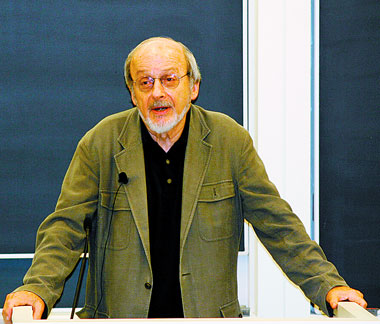By Keith Crandell
Edgar Allan Poe, that hard-drinking, suicidal 19th-century itinerant poet — a romantic figure to many — was remembered not too fondly by a namesake last Tuesday on the occasion of the dedication of the Poe Room in New York University’s Furman Hall, a law school building standing on the site of a small house where Poe lived and worked more than a century and a half ago.
Edgar L. Doctorow, who applied his considerable writing talents in a vain attempt to save the Poe House, told a gathering of 75 people who braved the remnants of Hurricane Jeanne, that Poe was “our greatest bad writer.” Doctorow, a very good writer, has won virtually every major award available to writers of American fiction (notable works: “Ragtime,” “World’s Fair,” “City of God,” “Billy Bathgate” and his latest, “Sweet Land Stories,” a collection of short fiction).
Doctorow, raised in the Bronx, where Poe also lived briefly, received his given name in remembrance of Poe.
On Tuesday, he told of asking his mother how he came to be named for Poe, an addict to drugs and alcohol who lived a tormented life.
Doctorow recalled her stern reply: “That’s not funny.”
During the dispute between N.Y.U. and the community over the university’s decision to demolish the Poe House, which stood on what was once 85 Amity Pl., now W. Third St., Doctorow engaged in a lengthy correspondence with the then dean of the N.Y.U. School of Law, John Sexton, now N.Y.U. president, in which he urged N.Y.U. to reconsider.
His advocacy ended with the tragedy of 9/11, after which, Doctorow said on Tuesday, the struggle for the Poe House seemed to lose importance.
Poe, said Doctorow, was not a writer on a par with others of his era: Melville, Whitman, Dickinson, Emerson or Twain. “He wrote for the market — a strange genius of a hack writer.”
Poe also failed to meet Doctorow’s standard of public engagement. Last spring in a commencement speech at Hofstra University (during which he was virtually hooted off the podium for his sharp criticism for George W. Bush), Doctorow told graduates that they would soon find themselves “living not only in a house and a neighborhood but in history.” I told them it was “incumbent on citizens to be actively engaged in that history.”
Doctorow said on Tuesday that he could find no evidence that Poe was engaged in the great historic movement of his day — the gathering thrust to end American slavery, culminating in the Civil War.
Why, Doctorow was asked, did he expend so much energy in his effort to save the Poe House if he had such a low opinion of Poe as a writer or as a citizen?
With all his bad habits as a writer, Poe was an important figure in American culture, said Doctorow.
“He’s just like some relatives who won’t go away.”
Poe is memorialized by Poe museums in Richmond and Baltimore and a national historic site in Philadelphia. And by the Poe Room, a modest ground-floor room with its own entrance on what was Amity Pl. and a small collection of Poe House artifacts. The public will have access to the space on a “regular, scheduled basis,” according to N.Y.U.
During Poe’s forays into New York, he also lived on Carmine St. and E. Broadway and in Fordham. Poe died early on the morning of Oct. 7, 1849, in Baltimore, 155 years ago this Thursday. He was 40 years old.




































